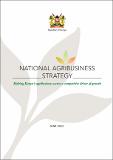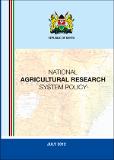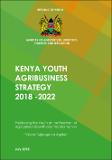| dc.description.abstract | In Kenya, agriculture contributes about 25 percent of gross domestic product (GDP) and provides a livelihood to three-quarters of the population. Food production plays an important part in maintaining the country’s food security, while the industrial and horticultural crops sub-sectors are important foreign exchange earners. However, the country’s agricultural potential is still
unrealised and its growth targets are not being met. Opportunities to add value to agricultural produce are largely unexploited. This, coupled with high production costs arising from escalating energy prices and poor infrastructure, makes Kenyan agricultural exports less competitive in global markets. Kenya Vision 2030 identifies agriculture as a key sector through which annual economic growth rates of 10 percent can be achieved. Under the Vision, smallholder agriculture will be transformed from subsistence activities, marked by low productivity and value addition, to ‘an innovative, commercially-oriented, internationally competitive and modern agricultural sector’.
One of the key drivers for this transformation is agribusiness, which is defined as including all businesses involved in agricultural production, including farming and contract farming, seed supply, agrichemicals, farm machinery, wholesale and distribution, processing, marketing and retail sales. The Kenya National Agribusiness Strategy has been developed by a National
Agribusiness Task Force. This is made up of private agribusiness practitioners and the public sector, and supported by the Agricultural Sector Coordination Unit (ASCU).
The strategy’s vision is to bring about a highly productive and efficient agribusiness sector, competitive both locally and internationally. | en_US |




